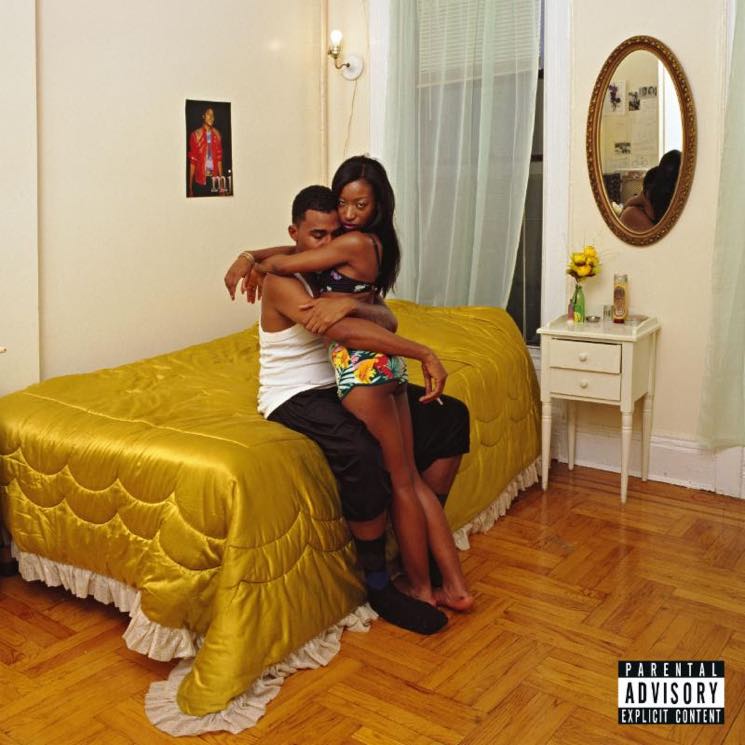If the masterful Cupid Deluxe found Dev Hynes perfecting the sound of Blood Orange, Freetown Sound is his attempt to perfect the project's message, saying everything he's always wanted to say while attempting to remove himself as the central voice. Or, as he recently put it: "With this one, I wanted to create the world, but then I wanted to disappear in it."
On Freetown Sound, Hynes has done just that, interlacing samples — of De La Soul, J Dilla, Ta-Nehisi Coates, Marlon Riggs and a woman from his father's native Freetown, Sierra Leone speaking in that country's native Krio — into his pop compositions to create a sound world in which others have as much room to speak as he does. The first voices we hear on opener "By Ourselves" are women's; the song ends with poet Ashlee Haze speaking passionately about the importance of representation and visibility of all kinds of black bodies and voices over a saxophone solo.
Hynes doesn't take the spotlight until second track "Augustine," and from there, he maintains a perfect balance of his and the voices of collaborators like Nelly Furtado (on the harmonically brilliant "Hadron Collider"), Debbie Harry, Bea1991, Kelsey Lu and Empress Of, who shines on early highlight "Best to You."
He sings poignantly and directly here about issues like gender (sampled conversation from Paris is Burning on "Desiree" questions the normalcy mainstream culture ascribes to heterosexual relationships), orientation, class and, particularly, race. "Are you okay?" he sings yearningly on the upbeat "Hands Up," a song about self-love whose context shifts dramatically when the chorus, "Hands up, get up," is swapped for chants of "Hands up, don't shoot" by the end. On the slower, Michael Jackson-esque "But You," he croons, reassuringly, that "You are special in your own way" before asking if you can see "the n***** in my face." Freetown Sound features the most direct, moving writing of Hynes' illustrious career.
Musically, Hynes employs similar sounds here to those on Cupid Deluxe, but the jazz and '80s pop and R&B timbres are interwoven with samples that warrant Hynes' comparisons of Freetown Sound to producers' beat tapes and the Beastie Boys' Paul Boutique. The result is a sprawling, cut-and-paste, idea-rich album that moves the listener as much physically as emotionally, coating the harsh truths and lyrical pills here with clean, honeyed production and uptempo, undeniable rhythms.
Freetown Sound finds Hynes at the peak of his powers, mixing his best songwriting and production yet to powerful, purposeful effect.
(Domino Recording Company)On Freetown Sound, Hynes has done just that, interlacing samples — of De La Soul, J Dilla, Ta-Nehisi Coates, Marlon Riggs and a woman from his father's native Freetown, Sierra Leone speaking in that country's native Krio — into his pop compositions to create a sound world in which others have as much room to speak as he does. The first voices we hear on opener "By Ourselves" are women's; the song ends with poet Ashlee Haze speaking passionately about the importance of representation and visibility of all kinds of black bodies and voices over a saxophone solo.
Hynes doesn't take the spotlight until second track "Augustine," and from there, he maintains a perfect balance of his and the voices of collaborators like Nelly Furtado (on the harmonically brilliant "Hadron Collider"), Debbie Harry, Bea1991, Kelsey Lu and Empress Of, who shines on early highlight "Best to You."
He sings poignantly and directly here about issues like gender (sampled conversation from Paris is Burning on "Desiree" questions the normalcy mainstream culture ascribes to heterosexual relationships), orientation, class and, particularly, race. "Are you okay?" he sings yearningly on the upbeat "Hands Up," a song about self-love whose context shifts dramatically when the chorus, "Hands up, get up," is swapped for chants of "Hands up, don't shoot" by the end. On the slower, Michael Jackson-esque "But You," he croons, reassuringly, that "You are special in your own way" before asking if you can see "the n***** in my face." Freetown Sound features the most direct, moving writing of Hynes' illustrious career.
Musically, Hynes employs similar sounds here to those on Cupid Deluxe, but the jazz and '80s pop and R&B timbres are interwoven with samples that warrant Hynes' comparisons of Freetown Sound to producers' beat tapes and the Beastie Boys' Paul Boutique. The result is a sprawling, cut-and-paste, idea-rich album that moves the listener as much physically as emotionally, coating the harsh truths and lyrical pills here with clean, honeyed production and uptempo, undeniable rhythms.
Freetown Sound finds Hynes at the peak of his powers, mixing his best songwriting and production yet to powerful, purposeful effect.
